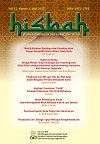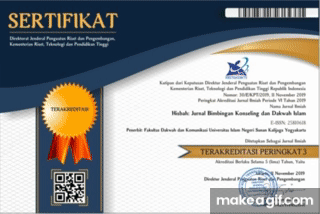AKUNTABILITAS GURU BK PADA PELAKSANAAN PROGRAM LAYANAN KLASIKAL MELALUI SISTEM EVALUASI PROSES
DOI:
https://doi.org/10.14421/hisbah.2023.201-04Abstract
The amount of management work makes reports on the program implementation process tend not to be carried out. On the other hand, the demand for accountability of counseling services in schools is increasing. There is an increase in the frequency of technology use in various fields, making all users get used to using it. Guidance and Counseling teachers are no exception in meeting the demands of program management. This study aims to examine the impact of the process evaluation system that has been developed in improving accountability attitudes in counseling programs. The research method used was Explanatory Sequential Design. In the first stage, quantitative measurement was carried out and then analyzed, followed by a qualitative stage and then analyzed. The results of the study showed a 20% change in attitude of the respondents. The biggest factor that causes it is because the system developed has simple features and has outputs that are easy to understand. It is hoped that this research will provide an impetus to the attitude of accountability, especially in the implementation of process evaluation.
Keywords: Accountability, Guidance and Counseling, Process Evaluation, Technology.
References
ABKIN (Asosiasi Bimbingan dan Konseling Indonesia). (2006). Penataan Pendidikan Profesional Konselor Dan Layanan Bimbingan Dan Konseling Dalam Jalur Pendidikan Formal. Bandung: ABKIN.
Adelman, H.S. (2002). School counselors and school reform: New Directions. Professional School Counseling, 5, 235-248.
American School Counselor Association (2013). The ASCA national model: A framework for school counseling programs (3th ed). Washington, D.C.: Author
Ardimen, A. (2017). Evaluasi Kinerja Konselor Dalam Proses Konseling Dan Riset Konseling Di Sekolah. In JURNAL EDUKASI: Jurnal Bimbingan Konseling (Vol. 3, Issue 1, p. 58).Universitas Islam Negeri Ar-Raniry. https://doi.org/10.22373/je.v3i1.1414
Astramovich, R.L. & Coker, J.K. (2007). Program evaluation: The Accountability bridge
model for counselors. Journal of Counseling & Development, 85: 162-172.
Canida, R. (2023). Upaya Meningkatkan Konsep Diri Dan Motivasi Belajar Siswa Dengan Layanan Bimbingan Klasikal. In Journal of Innovation Research and Knowledge (Vol. 2,Issue 12, pp. 4529–4536).Bajang Institute.
https://doi.org/10.53625/jirk.v2i12.5606
Attika, S., & Sukardi, T. (2021). Penerapan Media Teknologi Dalam Pemberian Layanan Bimbingan Dan Konseling Di Masa Pandemi. Jurnal Al-Taujih : Bingkai Bimbingan Dan Konseling Islami, 7(1). https://doi.org/10.15548/atj.v7i1.2669
Dewi, D. S., Cahyani, L., Saleh, Z., Fiah, N., Baen, S., & Badrujaman, A. (2023). Faktor Faktor Penghambat Pelaksanaan Evaluasi Bimbingan Dan Konseling Di Sekolah Menengah Atas Kota Tangerang. Jurnal Mahasiswa BK An-Nur : Berbeda, Bermakna, Mulia, 9(2). https://doi.org/10.31602/jmbkan.v9i2.11030
Gysbers, N.C., & Henderson, P. (2003). Developing and managing your school guidance and counseling program (4th ed). Alexandria, VA: American Counseling Association.
Hartini, S., Bhakti, C. P., & Rodhiyya, Z. A. (2021). Kesiapan teknologi Guru Bimbingan dan Konseling/ Konselor dalam Pelaksanaan Layanan Bimbingan dan Konseling. PROSIDING Seminar Nasional “Bimbingan Dan Konseling Islami.”
Lambie, G. W., & Haugen, J. S. (2021). The Assessment of School Counseling Competencies as a Tool to Support School Counseling Students, Supervisors, and Training Programs. In Professional School Counseling (Vol. 25, Issue 1, p. 2156759). SAGE Publications. https://doi.org/10.1177/2156759x20981050
Mashudi, E. A., Nuroniah, P., Sundari, N., & Ridwan, I. R. (2023). Menggapai Akuntabilitas: Evaluasi Program Bimbingan dan Konseling di Taman Kanak-Kanak. In Murhum : Jurnal Pendidikan Anak Usia Dini (Vol. 4, Issue 2, pp. 808–822). Perkumpulan Pengelola Jurnal PAUD Indonesia. https://doi.org/10.37985/murhum.v4i2.397
Mujiyati, M., Mayasari, S., & Adiputra, S. (2020). A Comparison of Accountability Models in School Counseling Programs. Konselor, 9(3). https://doi.org/10.24036/0202093110561-0-00
Nanda, W., & Saputra, E. (2015). Pengenalan Model Jembatan Akuntabilitas : Sebuah Kerangka Evaluasi Program. Jurnal Fokus Konseling, 1(1).
Nisya, W., Ahmad, R., & Syukur, Y. (2024). Akuntabilitas Layanan Bimbingan dan Konseling di MAN 1 Pekanbaru. In Prophetic : Professional, Empathy, Islamic Counseling Journal (Vol. 6, Issue 2, p. 190). IAIN Syekh Nurjati Cirebon. https://doi.org/10.24235/prophetic.v6i2.16662
Putri, J. E., Yarni, N., & Ahmad, R. (2022). Urgensi Akuntabilitas dan Pengawasan; sebagai Solusi Masalah Pelayanan Bimbingan dan Konseling di Sekolah. In JPGI (Jurnal Penelitian Guru Indonesia) (Vol. 7, Issue 1, p. 154). Indonesian Institute for Counseling, Education and Therapy. https://doi.org/10.29210/021876jpgi0005
Rahman, F. A. (2022). Upaya meningkatkan Eksplorasi Karier Siswa melalui Layanan Bimbingan Klasikal Berbasis Daring. In Ideguru: Jurnal Karya Ilmiah Guru (Vol. 7, Issue 3, pp. 317–322). Dinas DIKPORA Daerah Istimewa Yogyakarta. https://doi.org/10.51169/ideguru.v7i3.366
Rasyid, M. (2019). Upaya Meningkatkan Penyesuaian Diri melalui Layanan Bimbingan Klasikal dengan Teknik Permainan Edukatif. In JCOSE Jurnal Bimbingan dan Konseling (Vol. 2, Issue 1, pp. 35–39). Universitas Pancasakti. https://doi.org/10.24905/jcose.v2i1.49
Rosidah, A. (2017). Layanan Bimbingan Klasikal untuk Meningkatkan Konsep Diri Siswa Underachiver. In Jurnal Fokus KonselinG (Vol. 3, Issue 2, p. 154). Universitas Muhammadiyah Pringsewu. https://doi.org/10.26638/jfk.53.2099
Tjahyanti, N. L. P. A. S. (2021). Hubungan Perkembangan Teknologi Informasi Dalam Bimbingan Dan Konseling. Daiwi Widya, 7(5). https://doi.org/10.37637/dw.v7i5.670
Triyono, T., Dwi Febriani, R., Hidayat, H., & Nora Dwi Putri, B. (2019). Pelatihan Penggunaan Teknologi Informasi Kepada Guru Bimbingan Dan Konseling. Wahana Dedikasi : Jurnal PkM Ilmu Kependidikan, 2(1). https://doi.org/10.31851/dedikasi.v2i1.2829
Triyono, T., & Febriani, R. D. (2018). Pentingnya Pemanfaatan Teknologi Informasi Oleh Guru Bimbingan Dan Konseling. Jurnal Wahana Konseling, 1(2). https://doi.org/10.31851/juang.v1i2.2092
Sarjono, C. R., Nelyahardi, N., & Sarman, F. (2022). Persepsi Mahasiswa Bimbingan Konseling terhadap Kinerja Guru Bimbingan Konseling di Sekolah. Jurnal Pendidikan Tambusai, 6.
Sartini, S. (2018). Upaya Mengurangi Persepsi Negatif Siswa terhadap Guru BK Melalui Layanan Informasi di Kelas X MIA 4 MAN 3 Medan T.P 2017/2018.
Setiawan, M. A. (2016). Peranan Teknologi Informasi dalam Bimbingan dan Konseling. Bitnet: Jurnal Pendidikan Teknologi Informasi, 1(1). https://doi.org/10.33084/bitnet.v1i1.770
Sinta, U. A., Roebyanto, G., & Nuraini, N. L. S. (2022). Analisis Kesulitan Guru dalam Menyusun Soal Evaluasi Berbasis Hots Pada Pembelajaran Matematika di SDN Torongrejo 2. Jurnal Pembelajaran, Bimbingan, Dan Pengelolaan Pendidikan, 2(1). https://doi.org/10.17977/um065v2i12022p45-53
Sugiyono, (2017). Metode Penelitian Kuantitatif, Kualitatif, dan R&D. Bandung: CV. Alfabeta.
Sutirna, S. (2019). Layanan Bimbingan Dan Konseling: Bagi Guru Mata Pelajaran. In Jurnal Bimbingan Dan Konseling Ar-Rahman (Vol. 5, Issue 1, p. 6). Universitas Islam Kalimantan MAB Banjarmasin. https://doi.org/10.31602/jbkr.v5i1.1762
Utami, F. P. (2020). Evaluation of Career Guidance and Counseling Program through Accountability Model Bridge. … Conference on Technology, Education and Social …, 2020.

Downloads
Published
Issue
Section
License
Authors who publish with this journal agree to the following terms:
- Authors retain copyright and grant the journal right of first publication with the work simultaneously licensed under a Creative Commons Attribution License that allows others to share the work with an acknowledgement of the work's authorship and initial publication in this journal.
- Authors are able to enter into separate, additional contractual arrangements for the non-exclusive distribution of the journal's published version of the work (e.g., post it to an institutional repository or publish it in a book), with an acknowledgement of its initial publication in this journal.
- Authors are permitted and encouraged to post their work online (e.g., in institutional repositories or on their website) prior to and during the submission process, as it can lead to productive exchanges, as well as earlier and greater citation of published work.











